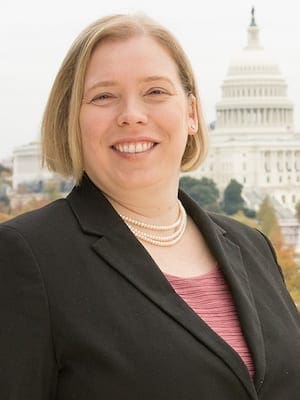
The newest attack on public education began last month when Florida rejected the AP African American Studies course. Next, some Florida officials questioned the value of all AP classes and considered an alternative provider to the SAT college entrance exam – one which would focus on “the classical and Christian tradition.”
As threats to public education proliferate, Public Schools Week is an opportunity for us to celebrate the positive role public schools play in our communities. Attacks on public education are often fueled by Christian nationalism, a political ideology that seeks to merge our American and Christian identities, suggesting that “good” Americans are Christians and that “real” Christians are Americans who hold certain opinions on political issues.
Christian nationalism thrives off the carefully curated myth that the United States was founded as a “Christian nation.” And it thrives off social studies curriculum that downplays the contributions of Black Americans, immigrant communities, religious minorities, Indigenous groups, and all others who undercut the narrative that white Christians have a special role in founding and leading this country.
The easiest way to dispel the “Christian nation” myth is to read the U.S. Constitution. When our Constitution was written, most states had some form of a religious test that ensured only certain Christians were eligible to represent their neighbors in the government. This system was explicitly rejected when the no-religious-test clause was included in Article VI, guaranteeing that religious belief would not be a precondition for elected federal office.
Fortunately, a recent survey indicates that 70% of Americans know that the Constitution doesn’t allow the government to declare the U.S. a Christian nation, but 38% wanted the government to do so anyway. We have much work to do.
Christian nationalism-inspired attacks on public education take several forms. Christian nationalism pushes an agenda that includes attacking curriculum, denigrating teachers and promoting religion (specifically certain expressions of Christianity) at every possible turn.
Proponents of state legislation requiring the posting of “in God we trust” in schools describe the national motto as honoring our so-called “Judeo-Christian” heritage, claiming it is foundational to our identity as Americans (even though it was not declared to be our country’s official “motto” until 1954). When pushed about how this excludes the religious beliefs of many religious and secular Americans, proponents often backtrack, saying that the represented “god” is a generic placeholder for whatever view of the Divine one might have. Apparently, the Almighty needs an undercover public relations effort!
America’s constitutional setting ensures that religion thrives in its many manifestations. Trust in God, however, is not exactly a unifying characteristic of being an American, and our children in public schools should not be divided into insiders and outsiders based on religious belief.
Christian nationalism demands censorship of truthful portrayals of racism, sexism, family violence, and other human shortcomings which undercut the narrative of an idyllic society. It fears the conclusions that students might draw when they read an accounting of American history from a minority perspective such as the 1619 Project, a telling of American history that “plac[es] the consequences of slavery and the contributions of black Americans at the very center of the national narrative.” Books can explore various perspectives and challenging topics while being age appropriate.
Public schools may teach about the role of religion in history, but that’s not enough for Christian nationalism to succeed. Christian nationalism needs public schools to teach a version of Christianity that is compatible with state authority and freed from disagreement over interpretation. With the proliferation of Bible translations available, a class is only feasible if the curriculum has already chosen a single, correct interpretation of each passage being taught.
In statehouses across the country, the most powerful voices against Bible literacy bills have been clergy and Christian parents who testify that they don’t need the government dictating the “correct” interpretation of any biblical passage. After all, in “Philip’s encounter with the Ethiopian” recorded in Acts 8:26-40, the Bible itself tells us that interpretation matters!
Christian nationalism’s attack on American history also attempts to transform the founding generations into super-Christians and delete the presence of other religions. George Washington, Thomas Jefferson and other founders are transformed into devout, evangelical Christians while Islam – the religion of approximately one-third of enslaved Africans brought to the U.S. – is erased.
In debating Article VI, some were concerned that without a religious test a Muslim, Jew, Catholic or Universalist may one day become president. Our founding generations knew that people from a variety of faith perspectives lived here and contributed to building and maintaining our society. We shouldn’t let Christian nationalism constrict the narrative any further.
Since public schools educate approximately 90% of American schoolchildren, a robust history curriculum in our public schools is perhaps the most practical way to oppose Christian nationalism. Questions about whose history will be taught have repercussions far outside the classroom.
If we want to fight Christian nationalism on the ground in our local communities, we should start with advocating for strong public schools whose curriculum includes all of us and reflects American history as it was, not as a small group imagines it to have been.
Editor’s note: This article is part of a series for Public Schools Week (February 27 – March 3). The previous article in the series is:
How Making Sand Mandalas Is Like Teaching| Trevor Barton
Associate general counsel at BJC (Baptist Joint Committee for Religious Liberty).

